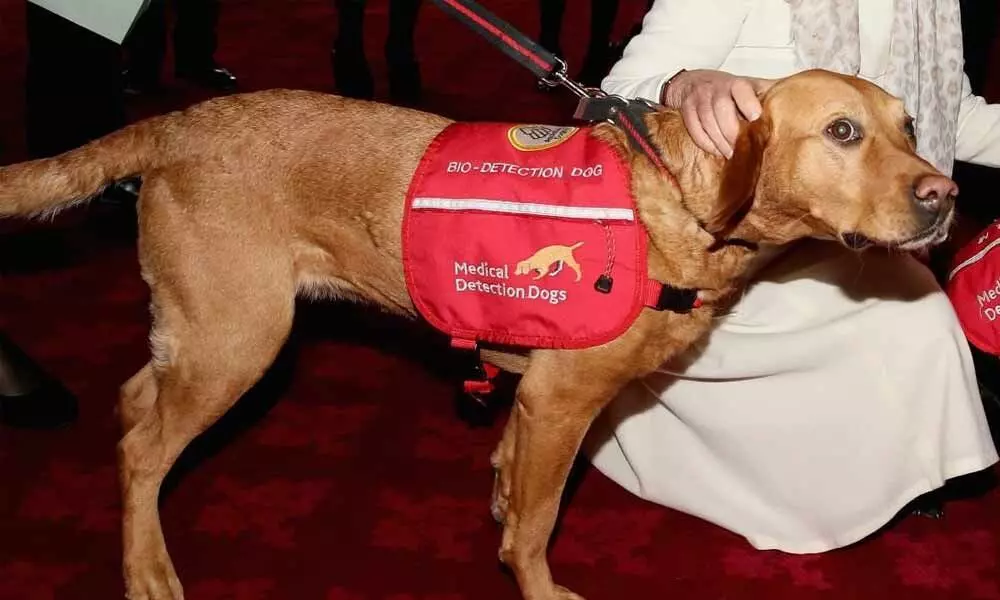Hyderabad: Dogs can detect diseases

Your four-legged friend can protect you from invisible things, too
Hyderabad: According to city veterinarians, it is possible that some dogs can detect diseases if they are trained properly. Labrador Retriever and Golden Retriever, German Shepherds are said to be among best breeds that can easily detect diseases, say doctors.
Since the dogs have tremendous smelling power, they can sniff out within a few minutes about the concentration of disease through specific odorous volatile organic biomarkers that are produced in pathological processing of cancer and other diseases which are emitted in the breath, blood, skin and urine samples.
Author Maria Goodavage's book, Doctor Dogs: How Our Best Friends Are Becoming Our Best Medicine, tells how dogs can perform a variety of medical tasks, helping in the labs to attending on the patients. The author says in an interview: "What the dogs are doing now is remarkable and it's because their sense of smell is so keen. They can sniff in parts per trillion. They can detect a tablespoon of a substance, like a packet of sugar, in two Olympic-sized swimming pools. Humans have six million olfactory receptors and dogs have up to 300 million. So their noses are really primed." (npr.org)
Speaking to The Hans India, Dr K Chandrashekar Reddy, a veterinarian at Enrich Animal Pet Clinic, Kothapet, said, "Compared to humans, dogs have a better sense of smell. If the dogs are trained properly, as in foreign countries and now in Punjab, they can easily detect the diseases from breath or blood of its owner. Studies done till date are very minimal and still the sense of smell of dogs is to be understood a lot."
Giving an instance of Epilepsy, he said, "The dogs can easily predict the attacks of epilepsy in their owner. The way in which dogs detect the imminence of fits is not known but it is useful to speculate on possible explanations. It is a well-known fact that an animal is capable of detection of electrical disturbances which can be correlated with epileptic episodes in human subjects. There may also be distinctive odors generated in the aura phase of epilepsy, which may be detected by sniffers."
It all began almost 30 years ago when a study reported that a woman with malignant melanoma ended up going to the doctor because her dog kept sniffing a skin lesion that she considered as totally fine. Doctors commented that this case was particularly interesting since the woman's cancer was at an early, curable stage. Cases like these prompted doctors to think that the dogs were somehow sniffing out the cancer cells.
Doctors have also suggested that pet therapy can help you get relief from stress and depression. Dr Mohammed Hashim, Animal Health Clinic, Manikonda, said, "Dogs are one of the best friends of humans and it is easily possible for them to detect the disease if they are trained. They can help you to get rid of the stress within yourselves. They can detect cancer. In 1989 a dog persistently sniffed at a mole on the leg of its owner and it turned out to be melanoma (a type of cancer that develops from the pigment-producing cells)."
According to interestingengineering.com, dogs also smell separately with each nostril, and then their brain compounds the result — very much like our brains compound the images captured by our eyes into one, holistic picture of reality. This allows dogs to devise a detailed profile of each odor. And there's more. Dogs also have a special organ in their nose, the vomeronasal organ that helps them identify pheromones, which are hormones that animals give out to communicate with others. This informs them, among others, when to stay off another dog's turf, if another animal is in heat, or if it found food nearby. While all dogs have an acute sense of smell, those with short faces — like pugs — don't fare as well as hunting dogs like greyhounds and dogs with long snouts in general.
J Anand, an animal behaviouralist and owner of 'Happy dogs Kennel' in Gachibowli, said, "One of the best ways to get away from the stress of the diseases is to have a good time with their pets mainly the dogs. When a person is in contact with any disease, they are stressed to such a level that they can fall sick to such an extent that they get hospitalized. There is still lack of awareness that their pets are the ones who can help them to get half of their diseases cured."








